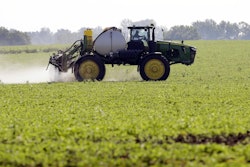FRESNO, Calif. (AP) — With temperatures in the Central Valley recently surpassing 110 degrees and state regulators investigating two possible heat-related deaths in the fields, the California legislature is considering new laws that would strengthen rules for protecting farmworkers from heat.
Proponents say existing regulations don't go far enough and the state's understaffed monitoring agency is unable to enforce them. As a result, they say, some farmers still fail to provide adequate shade and drinking water, farmworkers who toil long hours under a searing sun continue to die from heat stress, and employers aren't held accountable for violations, including those leading to injuries and fatalities.
"Right now, it's highly unlikely that farmers who break the rules will be caught," said Giev Kashkooli, political campaigns manager with the United Farm Workers of America, which is backing the bills. "Even if they are, the consequences are very light."
But state regulators and farmers say increased enforcement has paid off with greater compliance and fewer deaths.
At least 14 farmworkers have died of heat-related causes since 2005 when California adopted the nation's first rules requiring shade and water for the state's 450,000 farmworkers. There were three heat-related fatalities in 2008, none in 2009, one in 2010 and one last year. Two deaths this summer are being investigated.
In the nation's first such case, two farm supervisors charged in the heat-related death of 17-year-old worker Maria Isavel Vasquez Jimenez were sentenced last year to community service and probation, plus fines of $370 and $1,000 respectively.
"The death of a farmworker... was lightly regarded by the legal system. It was regarded as very close to excusable neglect," said San Joaquin County Deputy District Attorney Lester Fleming, who prosecuted the case.
Fleming said the vagueness of the labor regulations —such as no clear requirement to have water and shade within a certain distance from workers —made it difficult to send the supervisors to jail.
"It would make it easier to keep people accountable if it's spelled out," he said.
Federal regulations do not include standards for the prevention of heat stress. 21 states have their own worker safety programs — but California's rules specifically address heat illness prevention.
A string of 10 deaths — four of them farmworkers — in a two-month period in 2005 prompted regulators to introduce the new standards.
The rules require employers with outdoor workers to establish and implement emergency procedures, provide training on heat illness prevention, drinking water — at least one quart per hour per employee — and shade when temperatures are above 85 degrees.
A bill by Assemblywoman Betsy Butler, D-Marina Del Rey would require that water be available at all times within 10 feet of all employees and shade within 200 feet, regardless of temperature. Employers who broke the rules would have to pay up to $1 million in restitution. The bill would also allow farmworkers to sue employers if they failed to abide by heat rules.
The second bill, introduced by Assemblyman Charles Calderon, D-Whittier, would make it a criminal misdemeanor, punishable by jail and fines, to not provide adequate water or shade. Both bills are aimed at farmworkers only.
Farm groups call the bills— which are expected to come up for votes in the Senate later this month— highly impractical and unnecessary.
"We already have existing regulations in place. Growers have spent enormous time and money and effort to train employers and supervisors," said Bryan Little, the California Farm Bureau Federation's director of labor affairs.
Little said some of the proposed rules could prove physically impossible, such as keeping the water and shade within the required distance. Providing shade when it's not hot also makes no sense, he said.
Employers also fear the proposed rules could bring litigation, which ultimately will cost consumers.
"You'll have all these attorneys trying to motivate workers to call them, so they can file suits on their behalf," said Guadalupe Sandoval, managing director of the California Farm Labor Contractor Association.
California Division of Occupational Safety and Health (Cal/OSHA) says the current heat regulations are working and the state has ramped up enforcement in recent years.
"We... have devoted a third of our resources to heat illness prevention — and it is paying off with greater compliance and fewer deaths," said spokesman Dean Fryer in a statement.
In 2011, inspectors conducted 1,090 heat inspections, Fryer said. California has 81,500 farms.
But a lawsuit filed on behalf of farmworkers in 2009 said the agency fails to conduct inspections in response to some heat complaints and sometimes does not issue citations when inspectors find serious problems.
While declining to comment on the suit, Cal/OSHA's Fryer said the agency responds to every complaint and accident to determine if violations exist — and takes the appropriate action.
In Vasquez Jimenez's case, the agency issued a record fine of more than $262,000.
But agency data shows that fines often drop when appealed and have averaged less than $10,000 in other heat-related deaths.
The fine for the 2010 death of a farmworker was $375, which officials said reflected the fact that shade and water was accessible, and the employer had a written heat protection program and provided training.
The fines for the 2011 death of a farmworker and the 2011 heat-related injury of a 16-year-old worker are still under appeal, said Cal/OSHA officials.
Most farm employers, said Sandoval of the labor contractors group, try to do the right thing by their workers and should not be punished for a few "bad apples."
"In these days of increased farm labor shortages, our workers are extremely valuable," he said. "You don't want your worker to complain about bad conditions and go somewhere else."






















